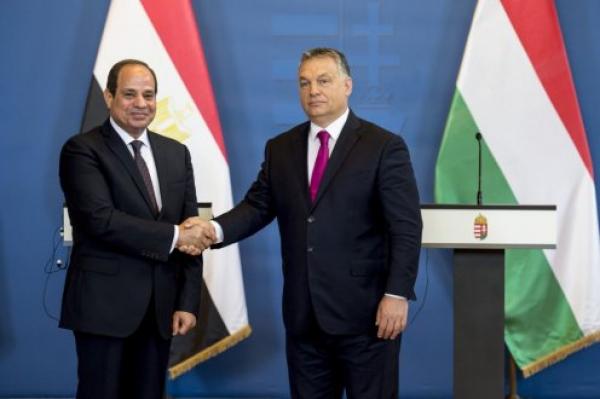
On Sunday, 2 July 2017 in the evening hours, on behalf of the government of Hungary, Minister of Defence Dr. István Simicskó received Head of State of Egypt Abdel Fattah el-Sisi and the delegation headed by him at Liszt Ferenc International Airport, Budapest. Heading an Egyptian delegation, Head of State of Egypt Abdel Fattah el-Sisi arrived in Hungary at the invitation of Prime Minister of Hungary Viktor Orbán.
In the Parliament Building on the next day Prime Minister Viktor Orbán had talks with President of Egypt Abdel Fattah el-Sisi, after their meeting Mr. Orbán described the security, military and economic stability of Egypt as a key interest for Hungary. In a press statement he made in the company of the Egyptian head of state, the Prime Minister said that Egypt is not only a nearby country, but “our neighbour in a political sense”, as it is a crucial state in the region, which “has a direct impact on our lives”. The opposite side of the Mediterranean is “part of European history”, Mr. Orbán remarked, and sooner or later what is happening over there will make its effect felt over here. He stated that one can now say that technological advance means that “what happens there at the beginning of the week will by the end of the week have an impact on Europe’s public security, its quality of life and its stability”. He stressed that the success of Egypt’s fight against terrorism is a precondition for calm and peace in Europe.
The Prime Minister of Hungary also congratulated Egypt on having managed to consolidate its economy, and pursuing a policy aimed at national unity. With regard to Hungarian-Egyptian relations, he said that the process of closer political cooperation is at an advanced stage, and the two countries have also managed to “open windows” on a number of economic issues. The Prime Minister said he expects Hungarian-Egyptian economic and trade activity to increase significantly within a short period.
The Prime Minister said that Hungary is convinced that Europe must play a part in the stability of the Egyptian economy, and Hungary and the V4 nations are ready to contribute what they can. They are convinced, he said, that the Brussels decision-making system should allow for high-level Egyptian-European negotiations as frequently as possible, that a more pragmatic approach should be adopted, and that the most practical economic policy possible should be developed between Egypt and the European Union.
At the Hungary-Egypt Business Forum organised by the Hungarian National Trading House to coincide with the visit to Budapest of President of Egypt Abdel Fattah el-Sisi, Prime Minister Viktor Orbán called for a breakthrough in Hungarian-Egyptian economic relations.
Speaking about the Hungarian economy to an audience of representatives from the two countries’ business communities, the Prime Minister noted that while Hungary has a population of only ten million, it is capable of generating annual exports worth USD 110 billion. In other words, he said, there is something “that we’re very good at”: building an open, export-oriented economy that enables a country of this size to respond flexibly to global demand and capital flows.
Mr. Orbán also spoke about Hungary’s workfare economic model, which sets out to achieve full employment. In relation to this, he stressed that if seven years ago someone admitted to having the goal of building an economy with full employment, “the customary response would be a smile”, but such a reaction “is perhaps no longer so fashionable”. He noted that this goal also “happens to feature” in the election programme of Germany’s Christian Democrats.
The Prime Minister observed that, in relation to Egypt, Hungary has created a flexible, supportive policy and attitude: “we understand the Egyptian people’s rejection of any outside interference in their internal affairs”. The European Union should also adopt a more constructive approach to the North African country, he remarked.
The Prime Minister also praised Egypt’s success in holding back migration, adding that “In order to address the migration crisis we must also conclude a comprehensive agreement with Egypt like the ones we have signed with other countries in the region”.
He further remarked that demand for the one hundred Hungarian state-funded university scholarships available to Egyptian students for the next academic year outnumbers supply by a factor of five. He therefore promised to increase the number of scholarships.
On the 4th of July 2017, in a press statement after the summit between the prime ministers of the Visegrád Four (V4) and President of Egypt Abdel Fattah el-Sisi, Prime Minister Viktor Orbán said that his fellow prime ministers had told the President Sisi of their recognition and appreciation of his work for stability in his country’s region. Speaking as host of the meeting in the Pest Vigadó, the Hungarian prime minister said that agenda topics had been terrorism, illegal migration, the stability of the Southern Mediterranean and the status and development of economic cooperation between Egypt and Central Europe.
Regarding migration, Mr. Orbán said that the Egyptian president and his government are making efforts to care for the millions of migrants currently in Egypt, to curb migration and to contain the situation. These efforts deserve recognition, the Prime Minister said, as they not only benefit Egypt, but equally the protection and stability of the entire European Union. Mr. Orbán stated that Hungary, situated in the southern half of the EU, is especially grateful to the Egyptian president for this work, which also protects the Hungarian borders.
The Prime Minister voiced his hope for future economic cooperation between Central Europe and Egypt, indicating that at present this cooperation is “far below its true potential”. He referred to President Sisi’s suggestion that a special cooperation scheme between Central Europe and Egypt should be set up to bring these economic opportunities to fruition.
Mr. Orbán also called for a meeting of the EU-Egypt Association Council as soon as possible, in order to review relations.
(sources: MTI/Kormany.hu)

